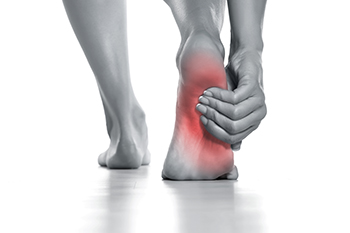
Clubfoot is a congenital condition where a baby’s foot or feet are twisted inward and downward, making them appear abnormal in shape and position. The exact cause of clubfoot is not fully understood, but it is believed to be a combination of genetic and environmental factors. It may occur when the tendons in the foot are too tight or shortened, causing the foot to rotate. In some cases, it can be associated with other conditions such as spina bifida or cerebral palsy. Symptoms of clubfoot include the foot appearing rotated, with the sole facing inward and the heel pointing downward. The affected foot may be smaller than normal, and the calf muscles may appear underdeveloped. If your child has been born with clubfoot, it is strongly suggested that you include a podiatrist on your healthcare team for effective treatment results.
Congenital foot problems require immediate attention to avoid future complications. If you have any concerns, contact Brian D. Jackson, DPM of Neuhaus Foot and Ankle. Our doctor can provide the care you need to keep you pain-free and on your feet.
Congenital foot problems are deformities affecting the feet, toes, and/or ankles that children are born with. Some of these conditions have a genetic cause while others just happen. Some specific foot ailments that children may be born with include clubfeet, polydactyly/macrodactyly, and cleft foot. There are several other foot anomalies that can occur congenitally. What all of these conditions have in common is that a child may experience difficulty walking or performing everyday activities, as well as trouble finding footwear that fits their foot deformity. Some of these conditions are more serious than others. Consulting with a podiatrist as early as possible will help in properly diagnosing a child’s foot condition while getting the necessary treatment underway.
What are Causes of Congenital Foot Problem?
A congenital foot problem is one that happens to a child at birth. These conditions can be caused by a genetic predisposition, developmental or positional abnormalities during gestation, or with no known cause.
What are Symptoms of Congenital Foot Problems?
Symptoms vary by the congenital condition. Symptoms may consist of the following:
- Clubfoot, where tendons are shortened, bones are shaped differently, and the Achilles tendon is tight, causing the foot to point in and down. It is also possible for the soles of the feet to face each other.
- Polydactyly, which usually consists of a nubbin or small lump of tissue without a bone, a toe that is partially formed but has no joints, or an extra toe.
- Vertical talus, where the talus bone forms in the wrong position causing other bones in the foot to line up improperly, the front of the foot to point up, and the bottom of the foot to stiffen, with no arch, and to curve out.
- Tarsal coalition, when there is an abnormal connection of two or more bones in the foot leading to severe, rigid flatfoot.
- Cleft foot, where there are missing toes, a V-shaped cleft, and other anatomical differences.
- Macrodactyly, when the toes are abnormally large due to overgrowth of the underlying bone or soft tissue.
Treatment and Prevention
While there is nothing one can do to prevent congenital foot problems, raising awareness and receiving neonatal screenings are important. Early detection by taking your child to a podiatrist leads to the best outcome possible.
If you have any questions please feel free to contact one of our offices located in Columbia and Pulaski, TN . We offer the newest diagnostic tools and technology to treat your foot and ankle needs.

Wearing high heels can dramatically change the way a person walks by shifting the body’s weight forward and placing extra pressure on the front of the foot. This altered gait can lead to shorter steps and reduced balance, increasing the risk of stumbling or falling. In the short term, high heels often cause blisters, corns, and pain due to pressure and friction. The risk of ankle sprains also rises as the elevated heel makes the ankle less stable on uneven surfaces. Over time, consistent use of high heels may lead to the shortening of the Achilles tendon, which can result in stiffness or pain even when not wearing heels. Additionally, long-term wear can also affect posture and spine alignment, contributing to discomfort and musculoskeletal strain throughout the body. If you have foot pain from wearing high heels, it is suggested that you schedule an appointment with a podiatrist who can treat various foot conditions, and guide you on suitable heel choices.
High heels have a history of causing foot and ankle problems. If you have any concerns about your feet or ankles, contact Brian D. Jackson, DPM from Neuhaus Foot and Ankle. Our doctor can provide the care you need to keep you pain-free and on your feet.
Effects of High Heels on the Feet
High heels are popular shoes among women because of their many styles and societal appeal. Despite this, high heels can still cause many health problems if worn too frequently.
Which Parts of My Body Will Be Affected by High Heels?
- Ankle Joints
- Achilles Tendon – May shorten and stiffen with prolonged wear
- Balls of the Feet
- Knees – Heels cause the knees to bend constantly, creating stress on them
- Back – They decrease the spine’s ability to absorb shock, which may lead to back pain. The vertebrae of the lower back may compress.
What Kinds of Foot Problems Can Develop from Wearing High Heels?
- Corns
- Calluses
- Hammertoe
- Bunions
- Morton’s Neuroma
- Plantar Fasciitis
How Can I Still Wear High Heels and Maintain Foot Health?
If you want to wear high heeled shoes, make sure that you are not wearing them every day, as this will help prevent long term physical problems. Try wearing thicker heels as opposed to stilettos to distribute weight more evenly across the feet. Always make sure you are wearing the proper shoes for the right occasion, such as sneakers for exercising. If you walk to work, try carrying your heels with you and changing into them once you arrive at work. Adding inserts to your heels can help cushion your feet and absorb shock. Full foot inserts or metatarsal pads are available.
If you have any questions please feel free to contact one of our offices located in Columbia and Pulaski, TN . We offer the newest diagnostic and treatment technologies for all your foot and ankle needs.

Ankle sprains are common in volleyball due to frequent jumping, sudden direction changes, and rapid lateral movements. Landing on an uneven surface, stepping on another player's foot, or twisting the ankle during play can stretch or tear the ligaments. The severity of a sprain is classified into grades. A Grade 1 sprain involves mild stretching of the ligament with slight swelling and discomfort. A Grade 2 sprain results in a partial ligament tear, moderate swelling, bruising, and difficulty bearing weight. A Grade 3 sprain is a complete ligament tear, leading to severe pain, significant swelling, instability, and an inability to walk. Proper warm-ups, strengthening exercises, and footwear with adequate support help reduce the risk of ankle sprains. If you have sprained your ankle while playing volleyball, it is suggested that you visit a podiatrist who can offer appropriate treatment.
Although ankle sprains are common, they aren’t always minor injuries. If you need your ankle injury looked at, contact Brian D. Jackson, DPM from Neuhaus Foot and Ankle. Our doctor can provide the care you need to keep you pain-free and on your feet.
How Does an Ankle Sprain Occur?
Ankle sprains are the result of a tear in the ligaments within the ankle. These injuries may happen when you make a rapid shifting movement while your foot is planted. A less common way to sprain your ankle is when your ankle rolls inward while your foot turns outward.
What Are the Symptoms?
- Pain at the sight of the tear
- Bruising/Swelling
- Ankle area is tender to touch
- In severe cases, may hear/feel something tear
- Skin discoloration
Preventing a Sprain
- Wearing appropriate shoes for the occasion
- Stretching before exercises and sports
- Knowing your limits
Treatment of a Sprain
In many cases, the RICE method (Rest, Ice, Compression, and Elevate) is used to treat ankle sprains. However, you should see a podiatrist to see which treatment option would work best with your injury. In severe cases, surgery may be required.
It is important to ask your doctor about rehab options after you receive treatment for your injury. Stretching, strength training, and balance exercises may help the ankle heal while also preventing further injury.
If you have any questions, please feel free to contact one of our offices located in Columbia and Pulaski, TN . We offer the newest diagnostic and treatment technologies for all your foot care needs.

Arch pain can affect people of all activity levels. The arch of the foot supports body weight, absorbs impact, and helps stabilize movement. Pain in this area may be linked to plantar fasciitis, the most common cause, where the ligament connecting the heel to the toes becomes inflamed from overuse or strain. Another cause of arch pain is posterior tibial tendon dysfunction, which occurs when the tendon that supports the arch weakens or becomes injured. Cavus foot, a condition involving unusually high arches, may lead to instability and pressure-related discomfort. Overpronation, where the foot rolls inward excessively while walking, can also place undue stress on the arch and nearby joints. Risk factors such as weight gain, aging, and repetitive stress on the feet may contribute to these conditions. Arch pain is sometimes felt in the heel, ball of the foot, or ankle, and may worsen during or after standing or walking. If you have pain in the arch of your foot, it is suggested that you schedule an appointment with a podiatrist for an exam and appropriate treatment.
Foot Pain
Foot pain can be extremely painful and debilitating. If you have a foot pain, consult with Brian D. Jackson, DPM from Neuhaus Foot and Ankle. Our doctor will assess your condition and provide you with quality foot and ankle treatment.
Causes
Foot pain is a very broad condition that could be caused by one or more ailments. The most common include:
- Bunions
- Hammertoes
- Plantar Fasciitis
- Bone Spurs
- Corns
- Tarsal Tunnel Syndrome
- Ingrown Toenails
- Arthritis (such as Gout, Rheumatoid, and Osteoarthritis)
- Flat Feet
- Injury (from stress fractures, broken toe, foot, ankle, Achilles tendon ruptures, and sprains)
- And more
Diagnosis
To figure out the cause of foot pain, podiatrists utilize several different methods. This can range from simple visual inspections and sensation tests to X-rays and MRI scans. Prior medical history, family medical history, and any recent physical traumatic events will all be taken into consideration for a proper diagnosis.
Treatment
Treatment depends upon the cause of the foot pain. Whether it is resting, staying off the foot, or having surgery; podiatrists have a number of treatment options available for foot pain.
If you have any questions, please feel free to contact one of our offices located in Columbia and Pulaski, TN . We offer the newest diagnostic and treatment technologies for all your foot care needs.







